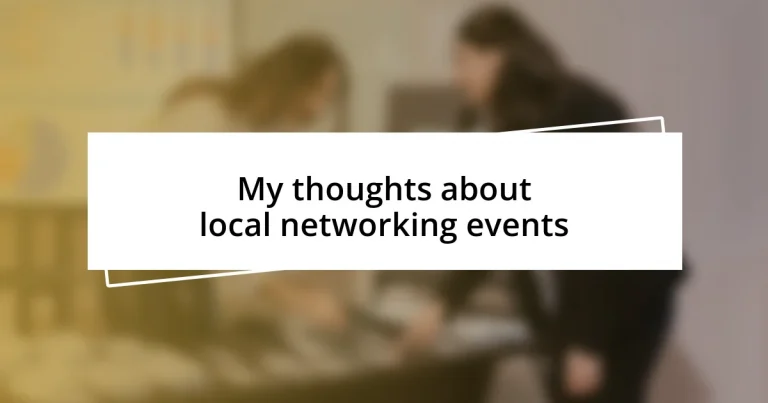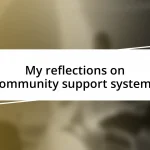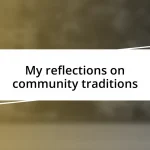Key takeaways:
- Networking events foster genuine connections and collaborations; casual conversations can yield greater opportunities than formal interactions.
- Effective preparation and follow-up techniques enhance networking success, including defining your personal brand and maintaining engagement after events.
- Continuous improvement of networking skills through self-reflection and active participation in workshops or local groups is essential for building a strong professional network.
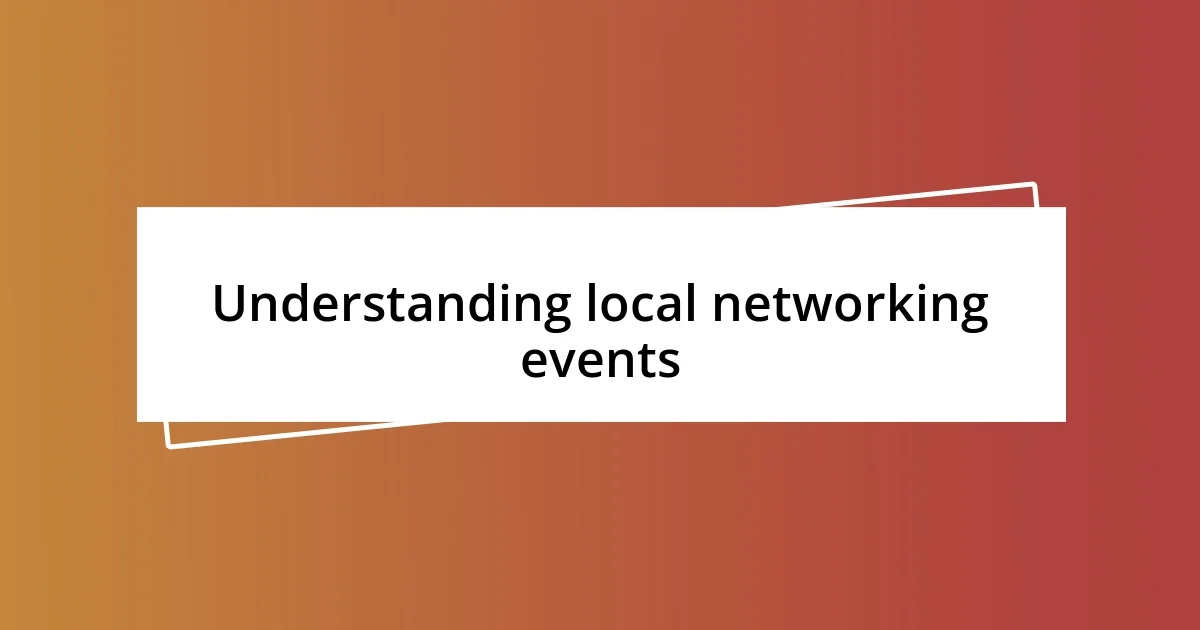
Understanding local networking events
Local networking events can feel a bit daunting at first, can’t they? I remember walking into my first event and scanning the room, wondering if anyone would want to talk to me. It’s a common fear, but it’s also an opportunity to connect with like-minded individuals who share your professional goals and passions.
These gatherings aren’t just about exchanging business cards; they foster genuine connections. I’ve found that my most rewarding opportunities have come from casual conversations over a cup of coffee rather than from formal presentations. It’s fascinating how a simple chat can lead to collaborations or even friendships that extend beyond the event.
Understanding the vibe of these events is crucial. Each one has its own culture, whether it’s laid-back and informal or structured and formal. I often ask myself, “What energies do I want to attract?” and it guides my approach. By being self-aware and authentic, I’ve noticed I leave a lasting impression on others – something every attendee should strive for.
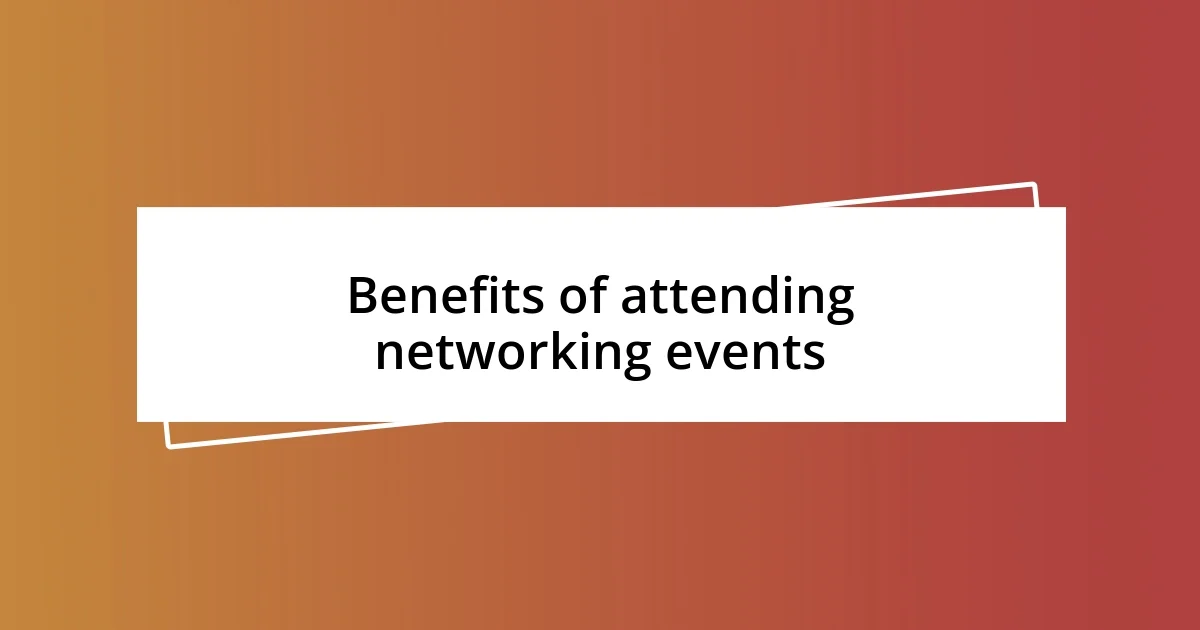
Benefits of attending networking events
Attending networking events offers a multitude of benefits, often extending far beyond mere professional connections. I’ve experienced firsthand how these environments can spark new ideas and inspire creativity. Engaging with diverse individuals from various industries has led me to explore innovative solutions and approaches that I might not have considered otherwise. Each conversation is a chance to learn something new, igniting my curiosity and encouraging growth in unexpected ways.
Here are a few key benefits of attending networking events:
- Relationship Building: You create lasting relationships that can lead to future collaborations.
- Skill Development: Interacting with different professionals can enhance your communication and social skills.
- Exposure to Opportunities: You might hear about job openings, projects, or partnerships that aren’t advertised widely.
- Personal Growth: Stepping out of your comfort zone helps build confidence and resilience.
- Access to Resources: You gain insights into industry trends, tools, and techniques that can be invaluable to your career.
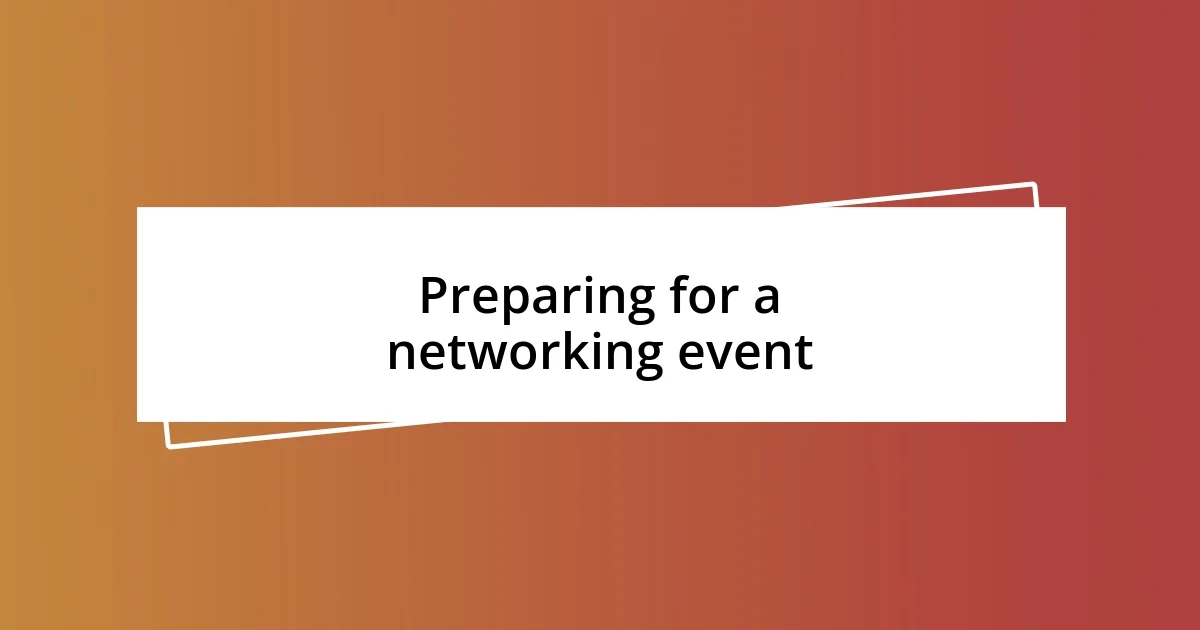
Preparing for a networking event
Preparing for a networking event doesn’t just involve showing up; it’s about setting yourself up for success. I always make it a point to gather information about the event beforehand. Knowing the attendees or the theme can help me tailor my approach. Plus, I find that having a few conversation starters or questions ready makes interactions much smoother. Has anyone else felt that awkward pause when trying to think of something to say? It’s much easier to dive right in when you have a plan.
I also recommend thinking about your personal brand. What message do you want to convey? Being clear about how I want others to perceive me helps shape my discussions. I remember one event where I focused on being approachable and genuine. The result? I had deeper and more meaningful conversations that truly resonated. These connections often turn into valuable contacts I can reach out to later.
Lastly, logistics can make or break your experience. I often prepare my outfit in advance, as feeling confident in what I wear boosts my self-esteem. Trust me, the right shoes can influence how I walk into a room! Having my business cards on hand and planning my journey also alleviates last-minute stress. A little preparation can go a long way in ensuring you make the most of your networking experience.
| Preparation Tips | Details |
|---|---|
| Research the event | Find out who will be there and what the focus is. |
| Define your personal brand | Consider how you want to be perceived and develop talking points. |
| Plan your attire | Choose an outfit that makes you feel confident and comfortable. |
| Organize logistics | Check travel details and have business cards ready. |

Strategies for effective networking
When it comes to effective networking, I believe it’s all about authenticity. I recall attending a local event where I struck up a conversation with someone who seemed shy and reserved. Instead of sticking to the usual formalities, I asked about their passion projects, and suddenly, we were exchanging ideas about our shared interests. That genuine curiosity opened doors to conversation and connection, proving that heartfelt engagement is far more impactful than simply handing out business cards.
Another strategy I’ve found valuable is the art of follow-up. After a networking event, I always take a moment to connect with new acquaintances on platforms like LinkedIn. I make it a point to send a personalized message that references something we discussed. This small gesture not only demonstrates that I valued our conversation but also reinforces that bond. Isn’t it fascinating how a simple follow-up can turn a fleeting chat into a lasting professional relationship?
Additionally, I believe that actively listening is a powerful tool in networking. I often find that when I’m truly present during conversations, I’m more in tune with the other person’s needs and goals. I remember a time when I listened attentively, which led to someone sharing amazing opportunities I had never considered before. This experience taught me that being an active participant can transform a networking encounter from superficial to significant, reinforcing the idea that networking is not about the number of people you meet, but the depth of those connections.
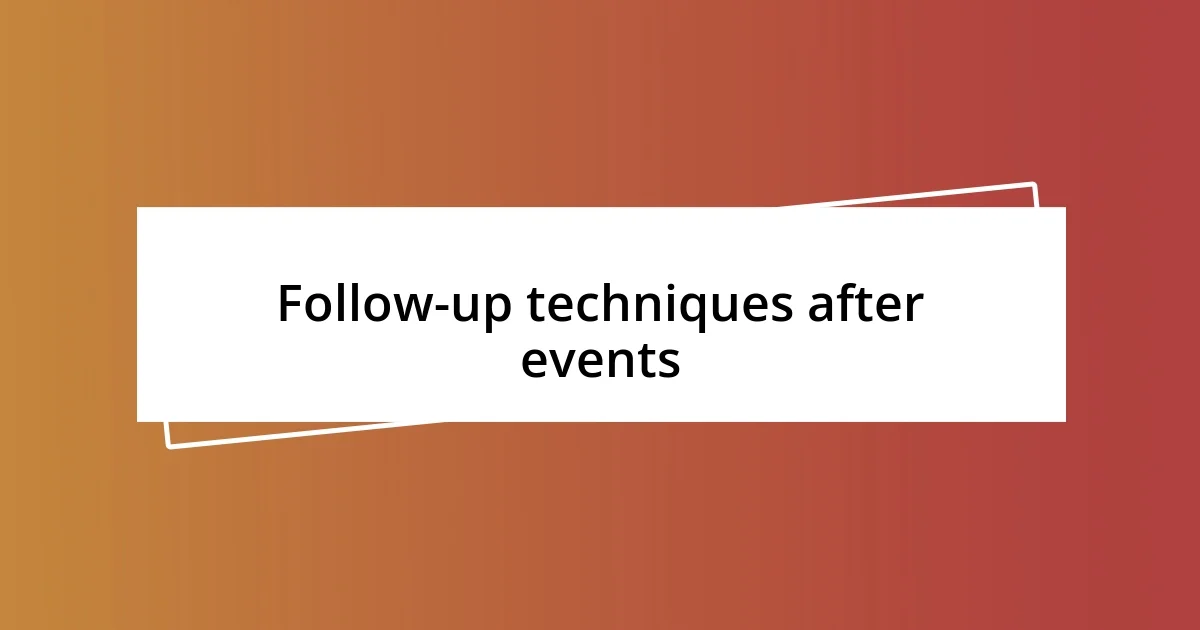
Follow-up techniques after events
Following up after a networking event is crucial to building lasting connections. From my experience, I find that sending an email or a LinkedIn message within 24 hours keeps the conversation fresh. I remember once messaging a fellow attendee right after we met, reminding her of our discussion about creative marketing strategies. She responded enthusiastically, and what started as a casual chat turned into a fruitful collaboration!
Another technique that works wonders is being specific in your follow-up. Rather than a generic “nice to meet you,” I like to mention a project we talked about or share an article relevant to our conversation. It shows that I was genuinely engaged and helps reignite that spark of connection. Have you ever received a message that references a specific detail from your chat? It really makes you feel valued and seen, doesn’t it?
I also make it a habit to note down our conversations immediately after the event. This helps me remember key details that I can bring up in future interactions. For example, I once jotted down a follow-up question about someone’s recent project, and when I reached out, it led her to share insights that were incredibly helpful. Keeping the dialogue alive this way has definitely made my networking efforts much more rewarding. So, how do you plan to follow up after your next event?
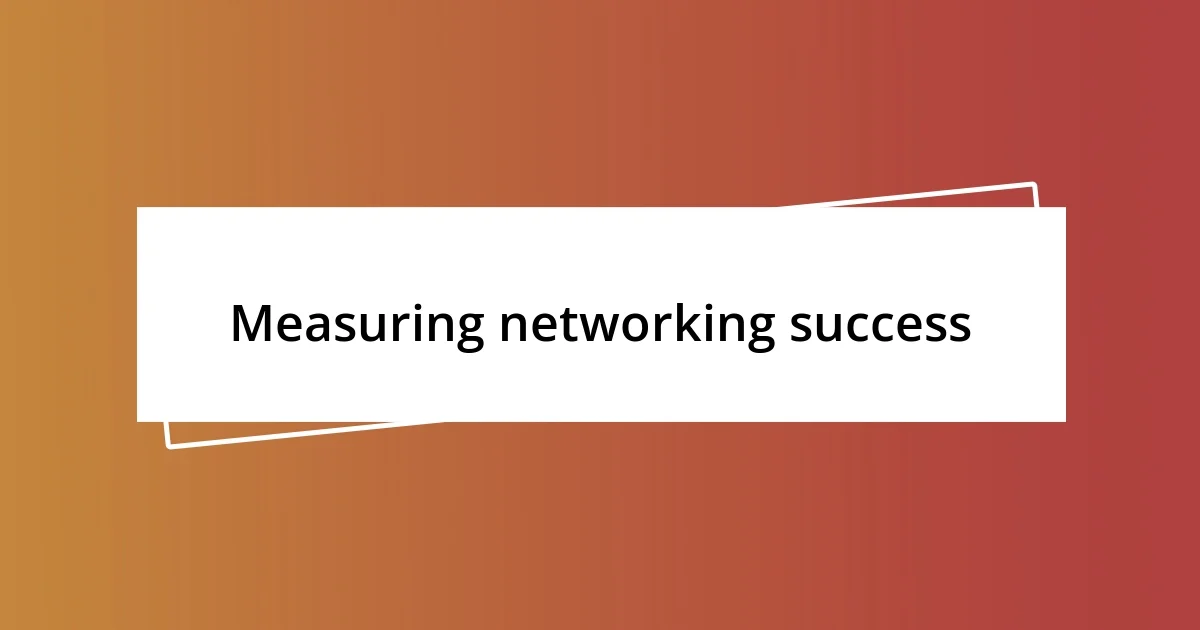
Measuring networking success
Measuring the success of networking can be quite subjective, but I tend to focus on the quality of connections rather than just the quantity. For instance, after a recent local event, I found myself reflecting on a meaningful conversation with an entrepreneur about sustainable business practices. The fact that this discussion inspired me to implement eco-friendly strategies in my own work felt like a significant win, providing greater satisfaction than simply collecting a stack of business cards.
I also track my networking success through follow-up interactions. One time, I reached out to someone I had met about a potential collaboration. When he replied with insights and suggestions, I knew that my outreach was impactful. It’s these moments of engagement that count. Have you ever noticed how a follow-up can lead to unexpected opportunities? That’s where the true measure lies—discovering how those initial conversations evolve over time.
Additionally, I like to gauge success by the feedback I receive from my connections. I remember reaching out to a few people after we discussed potential collaborations, and their positive responses filled me with a sense of accomplishment. It reminded me that building relationships is a continuous process, and celebrating those milestones—no matter how small—can make your networking journey so much more fulfilling. How do you gauge your success after a networking event?
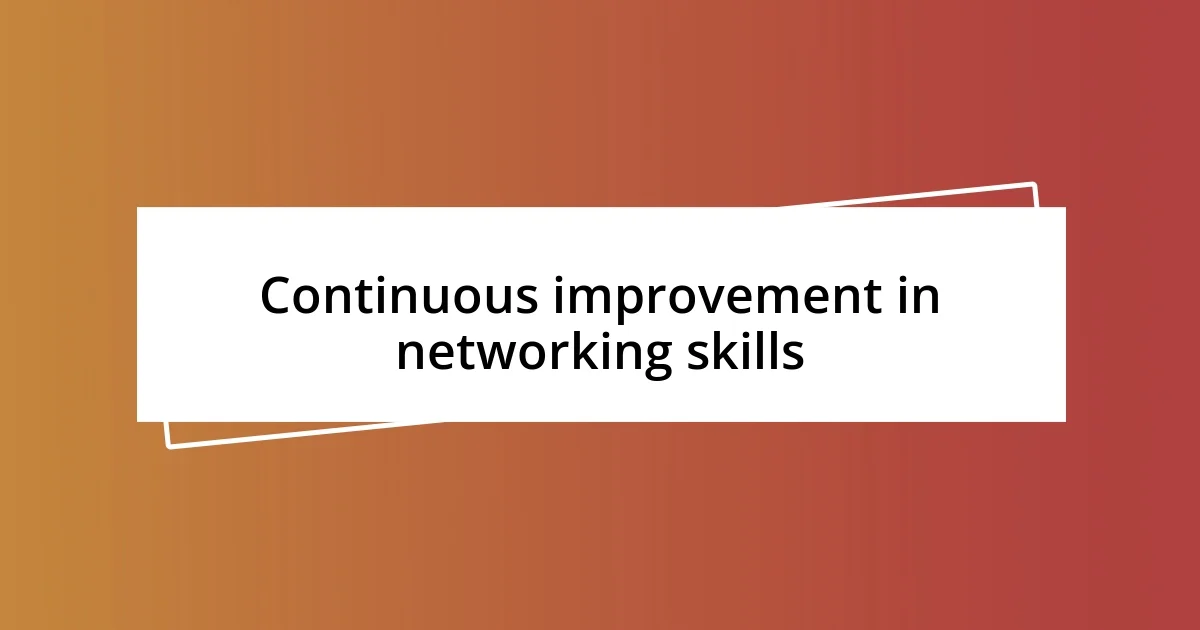
Continuous improvement in networking skills
Investing time in continuously improving networking skills is essential for building a strong and effective network. I remember attending a workshop focused on conversation techniques, and it transformed the way I approached networking. The facilitator emphasized the art of active listening—something I had never consciously practiced before. Have you tried really tuning in to what others are saying? It opens up opportunities for deeper interactions.
Another aspect I’ve learned to value is self-reflection after networking events. After each gathering, I take a moment to analyze what went well and what I could improve. For example, I once realized that I missed opportunities to ask open-ended questions. Now, I make it a point to prepare a few ahead of time. How can we expand our connections if we don’t have engaging questions ready? This constant assessment not only enhances my skills but also boosts my confidence in future encounters.
Participating in local groups or mastermind sessions has also played a vital role in my networking growth. I recall an experience where sharing my struggles in a small group led to a flood of supportive ideas that I hadn’t considered. It was a reminder that networking isn’t just about making connections, but also about sharing knowledge and experiences. Aren’t those moments of shared learning what truly enrich our networking journeys?












